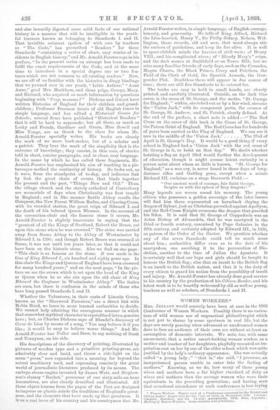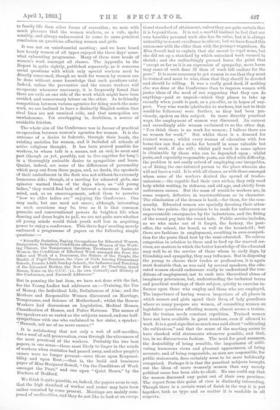WOMEN WORKERS.*
MRs. JELLABY would scarcely have been at ease in the 1892 Conference of Women Workers. Possibly there is no carica- ture of wild woman nor of impractical philanthropist which is not put to shame by some specimen in real life, but the days are surely passing when advanced or unadvanced women dare to face an audience of their own sex without at least an assumption of domestic interests. We note, too, with some amusement, that a rather smart-looking woman worker, as a mother and teacher of her daughters, playfully resented an im- putation cast on her by one of the older school, which was quite justified by the lady's ordinary appearance. She was actually called "a young lady ;" "that is," she said, "I presume, an inexperienced person unable to enter into the feeling of mothers." Knowing, as we do, how many of these young wives and mothers have a far higher standard of duty as wives and mothers than the average women who were their equivalents in the preceding generation; and having seen that occasional attendance at such conferences is less trying " Women Workers. Papers read at a Conference convened by the Bristol and Clifton Ladies' Association for the Caro of Girls, in November, 1592. London: Simpkin. Marshall, and Co r r'atol : Arrowsmith. 813. Also, Appendix Mooting of Rescue Workers. Same occasion and publishers.
to family life than other forms of recreation; we note with much pleasure that the women workers, as a rule, spoke sensibly, and always endeavoured to come to some practical conclusion on questions affecting women and girls.
It was not an uninfluential meeting; and we have heard how keenly women of all types enjoyed the three days' some- what exhausting programme. Many of them were heads of women's work amongst all classes. The Appendix to the Report is, quite rightly, published separately, as it concerns social questions with which only special workers need be directly concerned, though no work for women by women can be done without some knowledge that such questions exist. Indeed, unless the preventive and the rescue workers will co-operate whenever necessary, it is frequently found that there are evils on one side of the work which might have been avoided, and unnecessary labour on the other. As to friendly eompetition between various agencies for doing much the same work, we are inclined to have a distinctly English notion that rival lines are not unmixed evils, and that monopolies are unwholesome. Yet overlapping is, doubtless, a source of avoidable friction.
The whole aim of the Conference was in favour of practical co-operation between women's agencies for women. It is the outcome of a desire to federate, through their heads, the existing societies for women, and it included all schools of active religious thought. It has been proved possible for workers, to whom talk is a means, not an end, to meet and part (though as yet, possibly, not to live together for long!) in a thoroughly amicable desire to sympathise and learn. Quaint, indeed, are some of the differences of personality which peep out from these pages, and, no doubt, the spectacle of their embodiment in the flesh was not without its extremely humorous aide; though, at a meeting for educated girls, one spinster warned them of the days when, as "old young ladies," they would find lack of interest a tiresome frame of mind, and, as an encouragement, asked them to perceive "how we older ladies are" enjoying the Conference. One may smile, but one need not sneer; although, interesting as such occasions may be, true as it is that common pursuits and conversational powers do brighten life when dancing and dress begin to pall, we are not quite sure whether all young minds would think youth well lost in acquiring power to enjoy a conference. This three days' meeting merely embraced a programme of papers on the following simple questions :—
"Friendly Societies, Paying Occupations for Educated Women, Emigration, Industrial Conditions affecting Women of the Work- ing Classes, the Temperance Question, Treatment of Inebriate Women, the Conditions of Effectual Work amongst the Poor, the Office and Work of a Deaconess, the Sisters of the People, the Health of Pupil-Teachers, the Caro of Girls leaving Elementary Schools, Female Adult Sunday-Schools, the Influence and Teaching of the Educated Mother, the New Era and its Teaching, Quiet Hours, Notes on the C.C.C. [i.e., its own Council] and History of the Conference, and Farewell Addresses."
But in penning the last item, we have not done with the list, for the Young Ladies had addresses on :—Training, the Use of Money, the Individual Life, Definiteness of Aim ; and the Mothers and Responsible Women discoursed on Marriage, Temperance, and Science of Motherhood ; whilst the Rescue Workers had discussions on Legislation, Medical Homes, Classification of Homes, and Police Matrons. The names of the speakers are as varied as the subjects named, and one half- sympathises with one who exclaimed to her sister, a speaker " Hannah, tell me of no more causes!"
b It is satisfactory that not only a web of self-sacrifice,
rtt a woof of self-preservation, runs through the utterances of the most practical of the workers. Probably the two best papers, in one sense—those most likely to linger in the minds of workers when statistica had passed away, and other peoples causes were no longer present—were those upon Responsi- bility and upon Rest ;—that is, the lucid and luminous paper of Miss Margaret Sewell, "On the Conditions of Work amongst the Poor," Duchess of Bedford, and one upon "Quiet Hours," by the
We think it quite possible, as, indeed, the papers seem to say, that the high standard of worker and rester may have been rather resented by some present. Meetings are mainly com- posed of mediocrities, and they do not like to look at an excep- tional standard of attainment, unless they are quite certain that it is beyond them. It is not a morbid instinct to feel that our own humbler personal work also has its value, but it is always unhealthy to resent excellence in others; but we have found this commoner with the elder than with the younger organisers. So Miss Sewell had to explain that she meant to repel none, but she did set up a standard by which untrained work seemed to shrink ; and she unflinchingly pressed home the point that "except so far as it is an expression of sympathy, more harm may come of work done ill than of work left undone for the poor." It is more necessary to get women to see that they must be trained and must be wise, than that they should be devoted and should be willing. It was a really good deed, if nothing else was done at the Conference than to impress women with juster ideas of the need of not supposing that they can do anything—paid or unpaid—which they please to take up casually when youth is past, as a pis-aller, or in hopes of sup- port. Very wise words (platitudes to workers, but not to their would-be followers) were further, as they had been pre- viously, spoken on this subject. In more directly practical ways, the employment of women was discussed. An earnest and exceedingly able woman exclaimed to us the other day, "You think there is no work for women ; I believe there are no women for work." But whilst there is a demand for trained women ; whilst every woman of education with few home-ties can find a niche for herself in some valuable but unpaid work, if she will ; whilst paid work in some sphere is obtainable by those who can be depended upon ; whilst posts, and especially responsible posts, are filled with difficulty, the problem is not easily solved of employing our incapables, or of fitting the one-talented person to the place wherein she will not leave a void. It is with all classes, as with those amongst whom some of the workers desired the spread of trades. unionism ;—the capable find their own niches, they only need help whilst waiting, in. sickness, and old age, and chiefly from unforeseen causes. But the mass of would-be workers are, in some respect, defective in trustworthiness or in character. The elimination of the drones is hard,—for them, for the com- munity. Educated women are specially devoting their atten- tion to two points : the provision to be made for unforeseen or unpreventable emergencies by the industrious, and the fitting of the round peg into the round hole. Public service includes, as we who make use of it forget, the factory, the post. office, the school, the board, as well as the household ; but there are fashions in employment, resulting in over-competi- tion for the posts liked best by the semi-educated. To relieve congestion in relation to these and to feed up the starved ser- vices, are matters in which the better knowledge of the educated may well be at the service of those whom in early days, by friendship and sympathy, they may influence. But in disposing the young to choose their trades or professions, it is again most desirable that, as was said by several speakers, the edu- cated women should endeavour really to understand the con- ditions of employment, not to rush into theoretical abuse of imaginary grievances, but, understanding the technical terms and practical workings of their subject, quietly to exercise in- fluence upon those who employ and those who are employed. The importance of having women inspectors of all places in which women and girls spend their lives, of lady guardians where so many paupers are women, of consulting women on legislative questions affecting women, almost seems a truism. But the truism needs constant repetition. Trained women have not been available in great numbers, even if allowed to work. It is a good sign that so much was said about "cultivating the cultivators," and that the sense of the meeting seems to have checked wild statements whenever possible, and that, too, in no discourteous fashion. The need for good manners, the desirability of being sensible, the importance of culti- vating humorous views and pleasant appearances, of being accurate, and of being responsible, as men are responsible, for public statements, does certainly seem to be more habitually recognised. Perhaps it is that the practical subjects brought out the ideas of more womanly women than any merely political cause has been able to elicit. No one could say that the women discussed any point out of their own province.- The report from this point of view is distinctly interesting. Though there is a certain want of finish in the way it is put together, both as type and as matter it is readable in all respects.



































 Previous page
Previous page